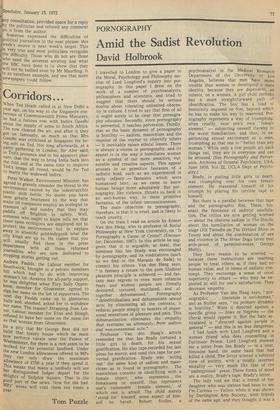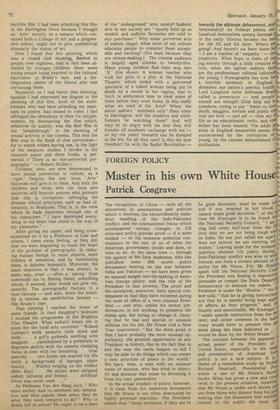PORNOGRAPHY
Amid the Sadist Revolution
David Holbrook
I travelled to London to give a paper to the Moral, Psychology and Philosophy sec tion of Lord Longford's inquiry into por nography. In this paper I drew on the work of a number of psychoanalysts, philosophers and scientists, and tried to suggest that there should be serious doubts about tolerating unlimited obscen ity in culture. I tried to say that first of all
it ought surely to be clear that pornography educates. Secondly, since pornography
is perverted, it teaches perversion. Thirdly, that as the basic dynamic of pornography is hostility — sadism, masochism and the impulse of the voyeur to objectify others — it inevitably raises ethical issues. There is always a victim in pornography, and its appeal is in the way it humiliates woman as a symbol of our more sensitive, vulnerable and creative aspects. This appeal arouses in us primitive fantasies of a sadistic kind, such as we experienced in early infancy — fantasies which were humanised later, as we came to know human beings more adequately. But pornography, like violence, thrusts us back in an anti-human way, to these primitive fantasies, of the infant unconsciousness.
The main objection to pornography, therefore, is that it is cruel, and is likely to teach cruelty.
On the train I read an article by Ernest Van den Haag, who is professor of Social Philosophy at New York University, on 'Is Pornography a Cause of Crime?' (Encounter, December, 1967). In this article he suggests that it is arguable, at least, that someone like Ian Brady was encouraged by pornography, and its vindications (such as we find in the Marquis de Sade) to commit his crimes. Van den Haag says, "in fantasy a return to the pure libidinal pleasure principle is achieved — and fantasy may regress to even more infantile fears and wishes; people are literally devoured, tortured, mutilated, and altogether dehumanised." Pornography " deindividualises and dehumanises sexual acts; by eliminating all the contexts, it reduces people simply to bearers of impersonal sensations of pleasure and pain. This dehumanisation eliminates the empathy that restrains us ultimately from sadism and non-consensual acts."
Professor Van den Haag's article reminded me that Ian Brady tortured a little girl to death, for his sexual gratification. He also tape-recorded her last pleas for mercy, and used this tape for perverted gratification. Brady was 'acting out' the same kind of sadism and masochism as is found in pornography. The masochism consists in identifying with a female object, who represents the femaleness in oneself, that represents one's vulnerable female element,' of which one is afraid. The child merely 'stood for' himself, some aspect of himself he hated. Robert Stoller, a psychoanalyst in the Medical Research Department of the University of Los Angeles, believes that men have more trouble than women in developing a male identity, because they are dependent, as infants, on a woman. A girl child perhaps has a more straightforward path of identification. The boy has a load of femininity imposed on him, beyond which he has to make his way to manhood. Pornography represents a way of triumphing, often cruelly, over one's own 'female element ' — subjecting oneself thereby to the worst humiliations, and then, in experiencing sexual excitement as a man, triumphing so that one is "better than any woman." While only a few people act such things out, they are in everyone and can
be aroused. (See Pornography and Perversion, Archives of General Psychiatry, USA, June 1970, Vol 22, UCLA Dept of Psychiatry.)
Brady, in putting little girls to death, was triumphing over his own female element. He reassured himself of his triumph by playing his terrible tape to himself.
But there is a parallel between that tape and the pornographic film. These, too, enact the fantasies of sadistic annihilation. The critics are now getting worried — about the obscene sadism in The Devils, about the humiliation of woman on the stage (Jill Tweedie on The Dirtiest Show in Town) and about the combination of sex and violence in The Straw Dogs (even that arch-priest of permissiveness, George Melly).
They have reason to be worried — because these instructions are teaching people to treat others as if they had no human value, and in terms of sadistic contempt. They encourage a sense of cruel superiority to others — who may be exploited at will for one's satisfaction. They decrease empathy.
As Professor Van den Haag says, "pornographic . . . literature is anti-human," and as Stoller says, "its primary dynamic is hostility." Were it directed against a specific group — Jews or Negroes — the liberal would oppose it. But the hate articulated is "directed against people in general" — and this is no less dangerous. I had lunch with Lord Longford and a woman friend who does counselling in Dartmoor Prison. Lord Longford showed me a letter from Ian Brady — in a neat, feminine hand, the same hand that had killed a child. The letter uttered a schizoid view of society, with a totally inverted morality — very much like that of the ' underground ' press. These forms of mind are a reality, Brady's tape, Brady's letter.
The lady told me that a friend of her daughter who was sixteen had been to see I'm Curious — Yellow when it was shown by Dartington Arts Society, with friends of the same age, and they thought it was a horrible film. I had been attacking this film in the Dartington News because I thought an 'Arts' society, on a campus which contamed both both a College of Art and a progressive school, ought not to give commercial obscenity the status of art.
Now I found that this showing, which was a closed club showing, limited to people over eighteen, had in fact been at tended by younger children. Here were young people being exposed to the cultural equivalent of Brady's tape, and a distinguished centre of the liberal arts was corrupting them.
Moreover, as I had learnt that morning, because I had expressed my disgust at the showing of this film, most of the sixth formers who had been attending my semi nars on poetry, had ceased to come. I had infringed the orthodoxy of their Oz enlight enment, by denouncing the film which, whatever its quality, was the first film in the ' breakthrough ' to the showing of sexual activity in the cinema. This was the first step in the flood of cine perversion— for to watch others having sex, in the light of the umpteen studies I invoke in my research paper and three books, is perverted. (" There is no non-perverted pornography" — Robert Stoller.) Children, then, are now determined to have sexual perversion in culture, as a 'right.' Despite the law, local 'Arts' Societies will give it to them. And both the children and those who run local arts societies will boycott anyone who protests that this is corruption, infringing the deepest ethical principles, such as lead ul timately, to Bradyism. That is, to the view which de Sade expresses through one of his characters: " I have destroyed everything in my heart that stood in the way of my pleasures."
After giving my paper, and being crossexamined on it by a Professor of Law and others, I came away feeling, as they did, that we were beginning to reach the heart of the problem of pornography. In reduc ing human beings to mere objects, mere holders of sensation, and by humiliating them, it debases humanity. Moreover, the main objection is that it was always, in some way, cruel — often a 'taking' from somebody (as by filming them), something which, it seemed, they would not give voluntarily. The pornography fantasy is a rape fantasy — and also, when the hostility is intense, an annihilation fantasy — like Brady's tape. That evening I reached the home of some friends. In their daughter's bedroom I studied the programme of the Brighton Film Theatre. What sadistic treats are in store for the local arts societies! "Roland Lethem's work assaults both mind and body . . . a girl's pudenda seething with maggots . . . cannibalised by a prostitute in flagrante delicto with the camera changing focus in time with her breathing . . . total anarchy . . . two lovers are scarred for life (with a background of baroque organ music) . . . Warhol verging on the violent (Bike Boy) . . . the actors were stripped naked, tortured and beaten . . . Artificial blood was never used . . ."
As Professor Van den Haag says, "Why must society lead its members into temptation and then punish them when they do what they were tempted to do?" Why is Brady left in prison? He ought to be a hero of the ' underground ' arts, surely? Sadistic acts in our society are "openly held up as models and sadistic fantasies are sold to any purchaser." Why make perverted acts of sadism illegal, when most of our culture educates people to consider these acceptable and exciting? (Not least because they are money-making.) The cinema audience is largely aged sixteen to twenty-five. Many young children find their way into ' X ' film shows. A woman teacher who took her girls to a play at the National Theatre, which ended with a perverted spectacle of a naked woman being put to death by a sword in her vagina, had to fetch in ambulance men to treat some of them before they went home. Is this really what we need of the Arts? When the above sadistic 'members only' films come to Dartington, will the students and sixthformers be watching them? And will they be so angry with me that they will forsake all academic exchange with me — so my ten years' research can be dumped in the bin, for all they care? Is this the new freedom? On with the Sadist Revolution — Spectator, January 15, )c towards the Ultimate debasement, and irrationality! As Polanyi points out, ! fanatical immoralists among German Ar in the early 'thirties became the matt:e( for the SS and SA later. Where are,ia going? And haven't we been there belo I I am a teacher of 'empathy' throtn creativity. What hope is there of irnrn ing society through a truly creative edllei tion, when the ugliest sadistic fanta3n: are the predominant cultural influences-1i the young ? Pornography has now bectif a horrible epidemic in England ',a threatens our nation's psychic health.il Lord Longford (who befriends BradY),h called a persecutor — and people 5c myself are thought (God help us) toy somehow, trying to put "limits on love.,)( death, maggots, torture and public coP4:c tion are love — and art — then my vt life as an educationist, critic, and orea' writer has been wasted. The adult Ole ation in England meanwhile seems Oki unconcerned by the corruption of tc young, by the current debauchment of ill civilisation. Si ../°1











































 Previous page
Previous page